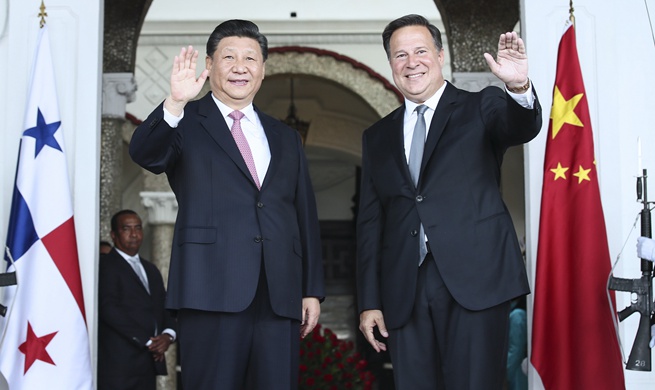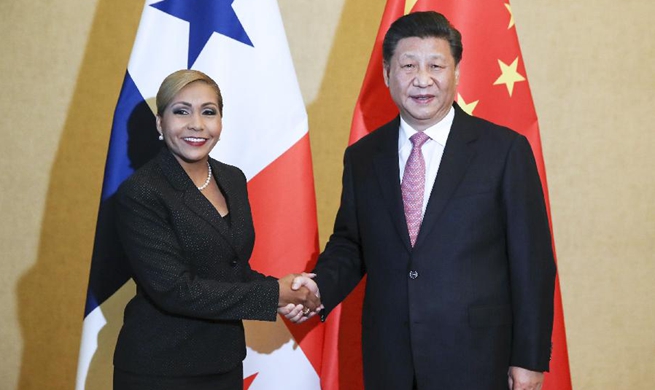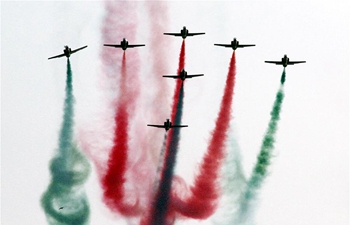by Keren Setton
JERUSALEM, Dec. 4 (Xinhua) -- Israel's military announced on Tuesday that it has begun an operation in its territory to "expose and thwart cross-border terror tunnels" that it said Hezbollah has built along the country's northern border with Lebanon.
Tensions between Israel and Hezbollah have been running high recently. Although Israel is currently only operating within its territory, there is always a potential of violence between the two foes.
"It is a bit early to tell but clearly there is risk of an uncontrollable deterioration," said Eran Ezion, former deputy head of Israel's National Security Council.
The head of the International Media Branch, Jonathan Conricus, told reporters during a phone briefing that this is "the first stage of the operation," adding that preparations have been going on for two years.
According to Conricus, Israeli forces up north have been put on "heightened alert" but no reserve forces have been called up and areas in the northern Israeli city of Metula have been declared closed military zones.
Israeli television channels broadcasted footage of tractors and bulldozers operating in the area.
"We see Hezbollah's activities as a flagrant and blatant violation of Israeli sovereignty," he added.
Since 2014, when the tunnel threat caused by militant organizations became apparent in its southern border with Gaza, Israel has been developing means to tackle the threat.
Residents of northern Israeli towns have complained for years that they hear suspicious noises under their houses. These complaints were checked by the IDF, which initially ruled they were unfounded.
The timing of the operation and its publication is a sensitive one.
In recent weeks, Israeli officials, including Prime Minister Benjamin Netanyahu, have said that Israel's northern borders with both Syria and Lebanon have become increasingly threatened.
Israeli forces have been busy fighting off the militant Hamas organization in its southern border in recent months.
But a few weeks ago, when the tension with Hamas seemed to be escalated, Netanyahu chose to contain the situation citing greater military challenges. It was widely speculated that he was referring to Israel's northern frontier.
His decision to go easy on Hamas was criticized by many in Israel, who thought he was being weak in face of increased missile fire on southern cities.
It also resulted in a major political crisis, including the resignation of the defense minister and a wobbly coalition which may fall at any given time.
"Netanyahu and other officials have constantly hinted that events in Gaza are far smaller threat to Israel compared with the northern frontier, Lebanon and Syria, which is much more challenging," said Eitan Shamir, from the political science department at the Bar Ilan University.
The anti-tunnel operation in the north began hours after the Israeli prime minister met with U.S. Secretary of State, Mike Pompeo, in Brussels.
The meeting was a surprise in which the two discussed "regional developments and the steps we are going to take together to block the aggression of Iran and its proxies in the north," according to the Prime Minister's Office.
"Israel is securing its U.S. wing ahead of possible military moves," said Ezion.
While it is widely believed that neither Hezbollah nor Israel are currently interested in a large-scale conflict, the history of the border shows that minor border incidents have the potential to spiral into an all-out war, like the one that occurred in 2006.
Since then, Hezbollah is believed to have improved its capabilities, including a significant increase in the number of missiles and in their precision.
Israeli defense officials believe that Iran is behind the weaponry upgrade of Hezbollah.
Israel has been busy fortifying its border with Lebanon in the past two years by building an extensive concrete barrier and creating artificial cliffs to prevent infiltration into the country.
Israel has also reportedly conducted hundreds of airstrikes against arms deliveries to Hezbollah in the past two years. These attacks have been carried out in Syrian territory where both Iranian forces and Hezbollah are present.
"We are in a transitional period, the war in Syria has been resolved. Now there is a re-organization of all sides to a new reality," Shamir told Xinhua.
Hezbollah will now return to Lebanon and re-focus back on the conflict with Israel. This includes missile precision improvement plants funded by Iran, added Shamir.
"Hezbollah is a proxy of Tehran," said Israeli Foreign Ministry Spokesman Emmanuel Nahshon on his Twitter account.
Hezbollah has been deeply involved in the Syrian civil war with reports of thousands of militants present to help stabilize the government of Syrian President Bashar al-Assad.
Hassan Nasrallah, head of Hezbollah, has frequently threatened a response to retaliate for Israeli actions in Lebanon, most recently last month.
Analysts believe that with the Syrian civil strife on a back-burner, Hezbollah can return to its original aim, threatening Israel.
"Hezbollah has publicly claimed to commit to an immediate response should Israel act against their missile depots," Ezion told Xinhua.
While Israel is currently operating on its side of the border and against tunnels, no one really knows how this situation could develop.
"The events are all connected," said Shamir, "and this is very disturbing for Israel."
The next few days will probably see Hezbollah to assess the situation. It is difficult to imagine a scenario by which the militant organization stands idly by as Israel foils one of its strategic military capabilities.
Tense times are ahead for both sides.

















